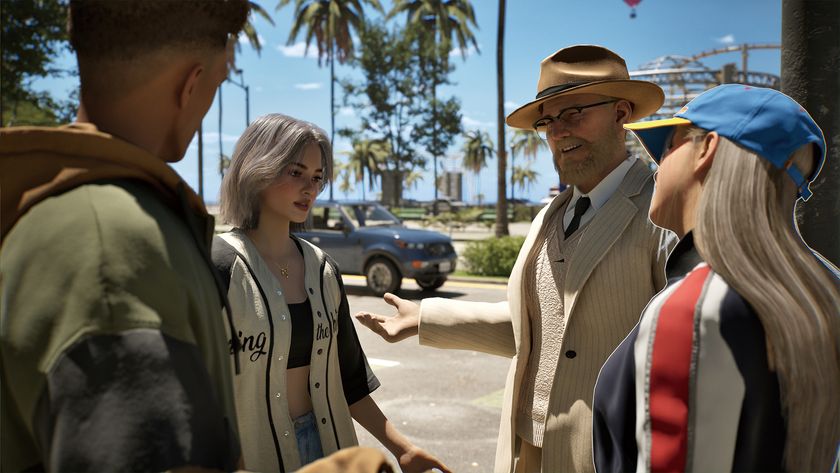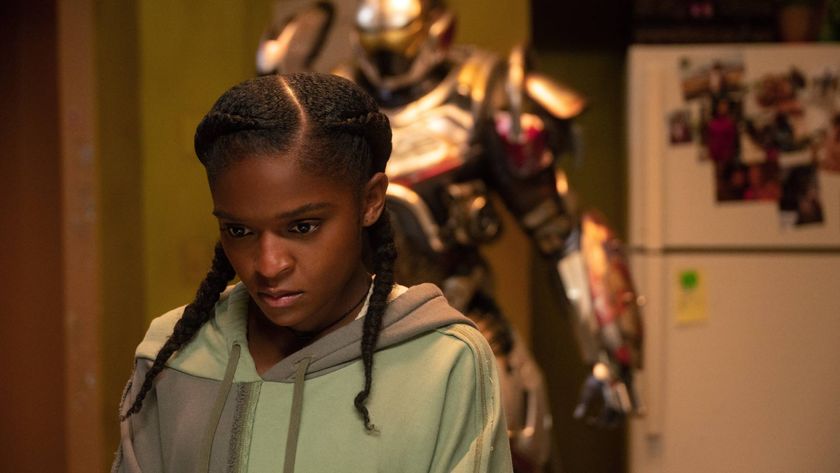Evercade is a promising product with teething issues
The team at Retro Gamer test this new mini-console
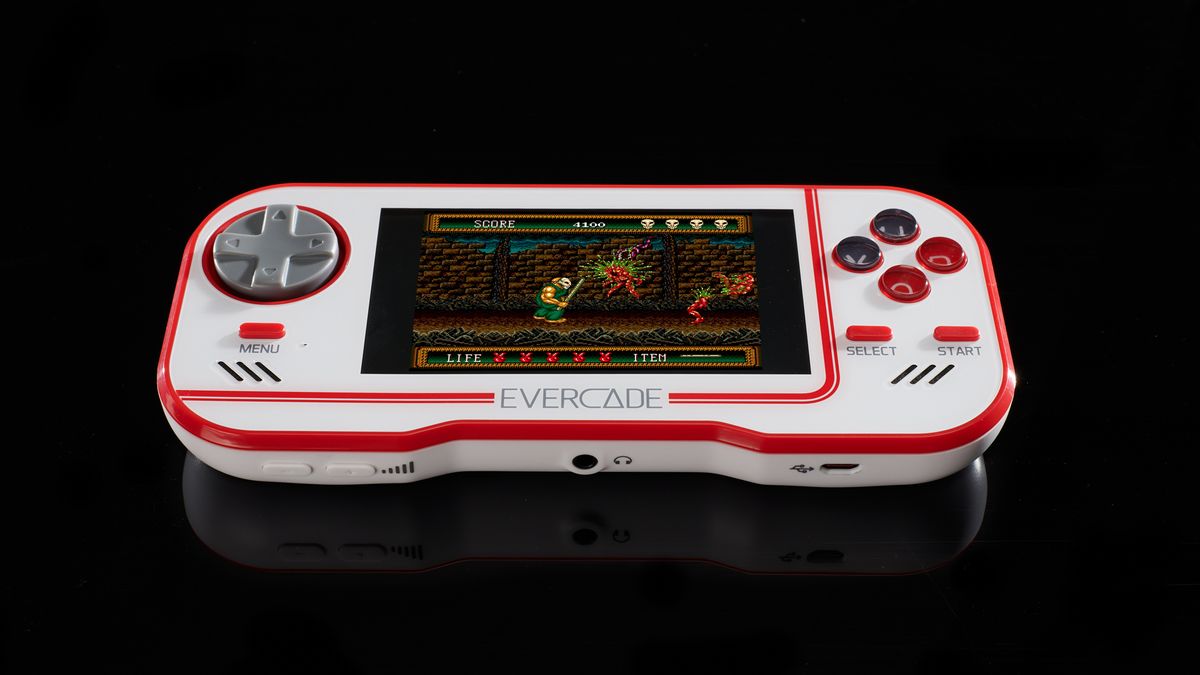
Update: we've now completed a full Evercade review if you'd like an in-depth report of the game after testing it out for longer. And if you'd like to check out similar retro throwbacks to gaming's classic years, be sure to take a look at our guide to the best retro consoles.
While the recent wave of mini consoles has been a good thing overall, it’s easy to understand why they don’t scratch the itch for everyone. With their fixed software line-ups, the fun inevitably has a limit. What’s more, they can’t offer one important part of the fun of retro gaming – building a collection. Blaze has attempted to fulfil that need with the Evercade, a dedicated retro gaming handheld that runs bespoke compilation cartridges. But does it represent a good way to play these games?
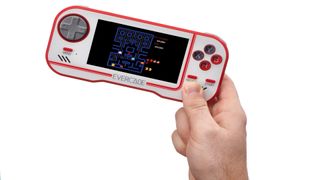
Released: Out Now
Price: From £59.99
Publisher: Blaze
Players: 1
The device itself is relatively basic, in order to keep costs down. An internal battery supplies 4-5 hours of power, and charges via an included micro-USB cable (though as with many devices these days, there’s no plug adapter included). A mini-HDMI port is present for TV output, though you’ll need to supply your own, and a standard headphone jack is present for audio. The controls consist of a digital d-pad, four face buttons and two shoulder buttons, and these feel excellent. The d-pad is both precise and comfortable to use, and the shoulder buttons offer a satisfying click when pressed. The device is also reasonably sized, and feels good to play with for extended periods.
Of course, for this price some compromises have been necessary, and the most notable is the screen. Colour reproduction is good and there was no blurring to note, but the display uses the same 480x272 resolution as the PSP – which is now rather low. Theoretically, this isn’t a problem as the games emulated by the system all run below this resolution. However there are no pixel perfect or integer scaling options, with just 4:3 or 16:9 options available, so on the handheld display you’ll get a fairly soft image with some shimmering during scrolling. TV output is 720p, and generally looks rather better than the handheld display, though shimmering is again unavoidable due to the way scaling is handled. For most players this will be fine, but if pristine image quality is of great importance to you, you may wish to look elsewhere.
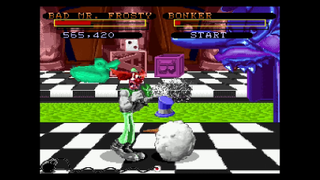
Upon starting the system, a short start-up screen is followed by a simple game selection menu displaying game details, a screenshot and box art. Pressing the menu button during a game allows you to access save states, change screen options or return to the game selection screen. So far, five systems are emulated – the NES and SNES, Atari 2600 and 7800, and Mega Drive. These are all handled well, with no speed or accuracy problems that we were able to notice. Interestingly, the games are not identical to their original cartridge counterparts – new copyright text is shown, which raises the possibility that Evercade versions of games may be able to carry bug fixes.
Ten cartridges are available at launch, with each priced £14.99 and offering between six and 20 games for a total of 122 games. The standard edition comes with Namco Museum Collection 1 (11 games), and the premium edition adds Atari Collection 1 (20 games) and Interplay Collection 1 (six games). The games are well packaged, with plastic boxes and full colour manuals, and feel like something you’d want to collect – and this is encouraged, as each release is numbered. The cartridges themselves are labelled on both sides, so you can easily identify them both in the box and during use.
If you’re okay with the fact that the arcade hits on offer are console conversions, the collections are put together well too. Big-name titles like Pac-Man, Earthworm Jim and Asteroids are present to draw people in, but plenty of the lesser-known games are just as enjoyable. What’s particularly good to see is that the team isn’t just treading the same well-worn ground – there aren’t many other places to get Atari 7800 games, for example. The question with a system like this is always long-term support, but three more cartridges are already scheduled for release in 2020.
Sign up to the 12DOVE Newsletter
Weekly digests, tales from the communities you love, and more
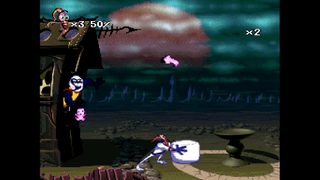
There are three major issues with the Evercade at launch. The biggest is that a minority of games exhibited random sound drop-outs and unpleasant corruption via HDMI, on both of the TVs we tried it on. This happened using both a capture device and connecting the Evercade directly to the TV. This is something Blaze has indicated will be fixed in a firmware update, but this was not available when we went to press.
There is also currently no way to remap control layouts independently of the game’s own options, and while in-game control options can mitigate that to some extent the defaults can be far from ideal. A day one firmware update has been issued to help alleviate the issue, but full mapping options would be welcome in future. Lastly, there is no way to connect a second controller, so multiplayer is out. This is by design – though games do retain their multiplayer modes, Blaze says these are for use in future Evercade products.
Broadly speaking, we like the Evercade. The hardware feels good in the hand, the level of performance doesn’t fall below the average of the mini consoles out there, and the ability to buy additional games is a powerful draw. If Blaze can sustain the levels of software support it has right now, the system will be a fun, low-cost way to collect and play retro games. However, all potential buyers are advised to check the status of firmware updates before purchasing the system, particularly if they want to play on a TV.
If used exclusively as a handheld, the Evercade is a fun, affordable device that already offers a good library of cartridges to collect. If you’re planning to play it on the TV, hold fire until a fix for the sound issues arrives.
For more in-depth reviews, retrospectives, and features on retro gaming, be sure to subscribe to Retro Gamer for as little as £2.77 an issue here.
Nick picked up gaming after being introduced to Donkey Kong and Centipede on his dad's Atari 2600, and never looked back. He joined the Retro Gamer team in 2013 and is currently the magazine's Features Editor, writing long reads about the creation of classic games and the technology that powered them. He's a tinkerer who enjoys repairing and upgrading old hardware, including his prized Neo Geo MVS, and has a taste for oddities including FMV games and bizarre PS2 budget games. A walking database of Sonic the Hedgehog trivia. He has also written for Edge, games™, Linux User & Developer, Metal Hammer and a variety of other publications.
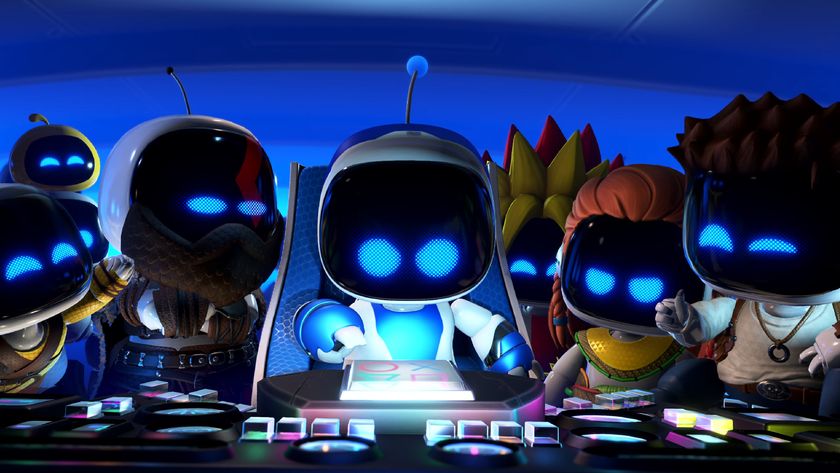
"30 years of history reside in our tape backups": PlayStation's building a game preservation mineshaft vault with 200 million files going back to a 1994 build of PS1 JRPG Arc the Lad

The other big Soulslike out this week has some Bloodborne and Dark Souls 3 in its combat, dev says, but "we would rather call AI Limit an action RPG"

